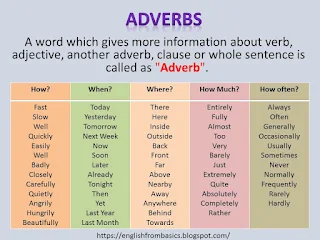Table of content
1. Introduction
2. What Are Adverbs?
3. Types of Adverbs
4. Formation of Adverbs
5. Functions of Adverbs
6. Conclusion
7. Adverb Worksheet/ Exercise
Adverbs: The Versatile Words that Add Flair to Your Language
Definition :
A word which gives more information about verb, adjective, another adverb, clause or whole sentence is called as "Adverb".
e.g. beautifully, now, away, very, generally, etc.
1. Introduction
Adverbs are the versatile chameleons of language, capable of transforming our sentences with a touch of flair. These words are like magic dust, adding details, intensity, and clarity to our descriptions. Whether we're talking about actions, adjectives, or other adverbs, adverbs have got our back! In this friendly guide, we'll explore the world of adverbs, their functions, types, and how they can make your language sparkle.
2. What Are Adverbs?
Adverbs are like the seasoning of language – they enhance the flavors of our sentences. These special words modify verbs, adjectives, or other adverbs, providing more information about how, when, where, and to what extent something happened. Adverbs are the dynamic storytellers that help us paint vivid pictures with words.
It provides information like How? When? Where? How Much? How often? the action happens.
For example:
- John dives car slowly.
- John dives car daily.
- John parks car there.
- John drives car very Fast
- John drives car always on Sundays.
Here you can see that the sentence is "John drives car"
- When you ask How? The answer is slowly. "Slowly" is an adverb which is giving more information about the verb "drive".
Similarly, for When? daily , Where? there, How much fast ? very & How often? always
- "Daily"- Adverb "Daily" is giving more information about the verb "drive".
- "There" - Adverb "There" is giving more information about the verb "park".
- "Very"- Adverb "Very" is giving more information about the Adjective "Fast".
- "Always" - Adverb "Always" is giving more information about "on Sundays".
"Daily", "There", "Very" and "Always" are also adverbs.
Most of the adverbs end with "ly" but it is not necessary.
For example: Continuously, Silently, Happily, Fast, Here, There, Sometimes, Often, etc.
3. Types of Adverbs
Adverbs come in different forms, each with a specific purpose in our language. Let's explore the various types:
1. Adverbs of Time:
These adverbs express when an action occurred. Examples include "now," "later," "soon," and "yesterday."
2. Adverbs of Place:
These adverbs indicate where an action took place. Examples include "here," "there," "everywhere," and "somewhere."
3. Adverbs of Manner:
These adverbs describe how an action was performed. Examples include "quickly," "carefully," "happily," and "efficiently."
4. Adverbs of Degree:
These adverbs show the intensity or degree of an action. Examples include "very," "extremely," "quite," and "almost."
5. Adverbs of Frequency:
These adverbs tell us how often an action occurs. Examples include "always," "often," "sometimes," and "rarely."
4. Formation of Adverbs
Let's see how can we from adverbs from adjective.
1. Simply add "ly" to adjective
For example: Kind-Kindly, Polite-politely, etc.
2. When adjective ends with "y" remove "y" and add "i" then add "ly"
For example: Happy- Happily, Angry- Angrily, etc.
3. Other adverbs
For example: Simple-Simply, Whole-Wholly, Careful-Carefully, etc.
5. Functions of Adverbs
1. Modifying Verbs:
Adverbs modify verbs, telling us how an action was performed.
- She sings beautifully.
- He sings happily.
- I drive car carefully.
2. Modifying Adjectives:
Adverbs can also modify adjectives, providing more detail or intensity.
- He is extremely talented.
- He is very intelligent.
- We were extremely happy.
3. Modifying Other Adverbs:
Adverbs can even modify other adverbs, emphasizing the degree of an action.
- She danced very gracefully.
- He answered very politely.
- Team played quite badly.
4. Modifying clause or sentence
Adverbs can even modify clause or entire sentence.
- Usually, We go for movie on weekends.
- Fortunately, John saved the puppy from falling in the river.
5. Expressing Time:
Adverbs tell us when something happened or for how long.
- We will meet tomorrow.
- I was playing football yesterday.
6. Showing Place:
Adverbs indicate where an action took place.
- They searched everywhere.
7. Demonstrating Manner:
Adverbs describe how an action was performed.
- She spoke softly.
6. Conclusion
Adverbs are the versatile words that elevate our language, making it more expressive and engaging. They modify verbs, adjectives, and other adverbs, adding valuable details about time, place, manner, and degree. Adverbs are like the spice that brings zest to our sentences, turning simple expressions into captivating narratives. So, let adverbs be your creative allies, infusing your language with flair and excitement!
7. Adverb Worksheet/ Exercise
Instructions: Read each sentence carefully and identify the
adverb. Write the adverb you find in the space provided.
1. She speaks softly to her baby.
Adverb: _________________
2. He quickly finished his homework.
Adverb: _________________
3. The car moved slowly through the traffic.
Adverb: _________________
4. They carefully planned their trip to Europe.
Adverb: _________________
5. The children played happily in the park.
Adverb: _________________
6. She danced gracefully across the stage.
Adverb: _________________
7. He eagerly volunteered to help with the project.
Adverb: _________________
8. The teacher spoke clearly to the students.
Adverb: _________________
9. They arrived late to the party.
Adverb: _________________
10. The rain fell steadily throughout the night.
Adverb: _________________
Answers:
- Adverb: softly
- Adverb: quickly
- Adverb: slowly
- Adverb: carefully
- Adverb: happily
- Adverb: gracefully
- Adverb: eagerly
- Adverb: clearly
- Adverb: late
- Adverb: steadily
(Note: Adverbs typically describe how, when, where, or to what extent an action is performed.)

No comments:
Post a Comment